|
View this email in a browser
- Senator Aument Statement on Governor Wolf’s Announcement of Counties to Move into Yellow Phase of Reopening
- Aument, Yudichak Propose Changes to Governor’s Emergency Declaration Powers to Promote Greater Collaboration, Transparency
- Senate Approves Bill Requiring Reporting of COVID-19 Cases
- Senators Call for Auditor General to Examine DCED’s COVID-19 Response
- Lancaster Legislators Urge Governor to Reconsider Regional Breakdowns for Reopening PA
- Limited Number of Outdoor Activities to Reopen on May 1
- Senate Approves Emergency COVID-19 Measures for Child Care Employees
- Senate Passes New Safety Measures for Child Care Facilities
- DOH Sets Standards for Resumption of Elective Surgeries, Procedures
- Legislation Would Provide Long-Term Authorization of Remote Notarizations
- Food Recovery Infrastructure Grant Program Expanded
- Additional Funding Will Support Seniors During COVID-19 Pandemic
Senator Aument Statement on Governor Wolf’s Announcement of Counties to Move into Yellow Phase of Reopening
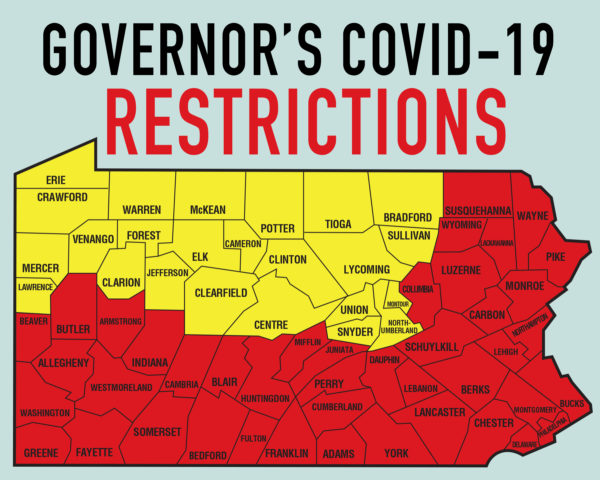
Counties in northwest and northcentral Pennsylvania will move to the yellow phase of COVID-19 reopening on May 8, while all other counties in the state will remain under Governor Wolf’s stay-at-home order, according to Governor Wolf’s announcement today.
The yellow phase of reopening will allow some businesses with in-person operations to open under strict health guidelines and building safety orders to reduce the risk of infection. Telework must still continue where feasible. Schools closures and restrictions on congregate care, prison visitation, and large gatherings of more than 25 people will remain in place. Indoor recreation, health and wellness facilities, and entertainment venues will remain closed, and restaurants and bars will still be limited to carry-out and delivery only.
Counties moving to the yellow phase include: Bradford, Cameron, Centre, Clarion, Clearfield, Clinton, Crawford, Elk, Erie, Forest, Jefferson, Lawrence, Lycoming, McKean, Mercer, Montour, Northumberland, Potter, Snyder, Sullivan, Tioga, Union, Venango, and Warren. All other counties in Pennsylvania will remain under Governor Wolf’s stay-at-home order. Only businesses deemed life-sustaining by the Wolf Administration are permitted to operate in those areas of the state.
I am deeply frustrated that no restrictions have been lifted for local employers and workers who can safely operate in counties that are still in the red phase.
We were told by Governor Wolf and his Administration at the beginning of his shutdown order that the purpose of these severe actions was to flatten the curve and prevent our healthcare system from becoming overwhelmed by cases. But now that significant progress towards both of those goals has been made, it seems that the Administration’s focus has shifted to a new goal –preventing all Pennsylvanians from getting sick. While I am certainly concerned about the public health impacts of reopening, it is clear that there are businesses in Lancaster County right now that could be open and operating in accordance with health and safety guidelines from the U.S. Centers for Disease Control (CDC) to protect their patrons and employees appropriately. It is unfair and unacceptable that the Governor continues to enforce such strict orders on Pennsylvanians, despite the fact that his own Health Department has said that the original goals of such orders have been achieved.
The full press release can be viewed here.
Aument, Yudichak Propose Changes to Governor’s Emergency Declaration Powers to Promote Greater Collaboration, Transparency
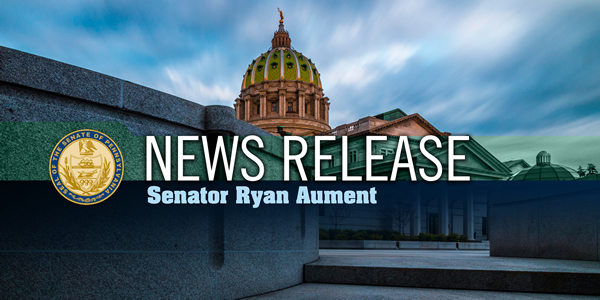
Responding to concerns about the Wolf Administration’s handling of some aspects of the COVID-19 crisis, I along with Senator John Yudichak (I-14) outlined a plan yesterday that would bring more collaboration and transparency to the process of responding to emergencies.
We will introduce legislation in the near future that would make necessary reforms to laws governing emergency declarations. The bill would:
- Automatically create a special bipartisan task force to work with the governor when an emergency is declared.
- Require any renewal of an emergency declaration to be approved by the General Assembly.
- Require timely notification to the General Assembly of any actions the Administration intends to take during the declared emergency.
Under the bill, a special Disaster and Recovery Task Force would be created during any emergency declaration to work with representatives of industries and populations impacted by the emergency to determine the best way to handle problems that arise.
One of the biggest failures of the COVID-19 response was the Governor’s refusal to work with anyone but those within his administration, creating an echo chamber of ideas and a lack of transparency. The task force will be able to collaborate in a way that will challenge assumptions about the best way to handle problems and take actions that can earn the confidence of the people of Pennsylvania.
The full press release can be viewed here.
Senate Approves Bill Requiring Reporting of COVID-19 Cases
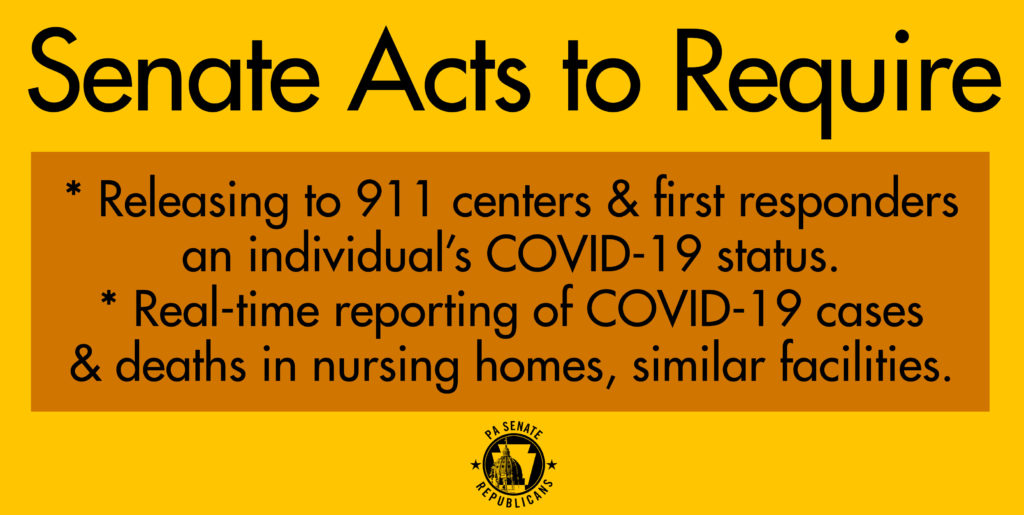
This week the Senate approved legislation I strongly supported that would require the state to notify local first responders of COVID-19 cases in their communities.
Senate Bill 1110 would require the Department of Health or local health authority to release to 911 centers, police, fire, coroners and EMS personnel an individual’s communicable disease status when the disease is the subject of an emergency disaster proclamation by the Governor. The information must be relayed within 24 hours of the department receiving information of a confirmed case of a communicable disease.
This is crucial during our COVID-19 public health emergency because local emergency responders do not have enough Personal Protective Equipment to use when responding to calls. Senate Bill 1110 would help them better prioritize and target the use of that equipment so they can protect themselves in situations where they know they will be exposed to COVID-19 on the job.
The bill also requires real-time reporting of COVID-19 cases and deaths in Pennsylvania’s nursing and personal care homes and assisted living facilities.
More than 60 percent of COVID-19 deaths in the Commonwealth have occurred in nursing homes, assisted living facilities and personal care homes. Pennsylvania has approximately 700 nursing homes with more than 88,000 beds and more than 1,200 licensed personal care homes serving approximately 46,500 residents.
Senators Call for Auditor General to Examine DCED’s COVID-19 Response

The Wolf Administration has been widely criticized for its handling of the waiver process for businesses that wished to stay open during the shutdown of businesses not deemed life-sustaining. Questions have also been raised about why the Administration’s list of business closures was more restrictive than federal guidelines.
I recently joined many of my colleagues in calling for Auditor General Eugene DePasquale to immediately conduct an audit of the Department of Community and Economic Development to shine a light on these issues and explain why more than 1.6 million Pennsylvanians were forced into the Unemployment Compensation system – more than every state except California.
The text of our letter to the Auditor General is available here.
Lancaster Legislators Urge Governor to Reconsider Regional Breakdowns for Reopening PA
I, along with other elected officials from Lancaster County, sent a letter to Governor Wolf earlier this week urging him to reconsider his classification of Lancaster County as part of the Southeastern region as he considers when to allow Pennsylvania regions to reopen.
Lancaster County has far more in common with Lebanon and York counties than it does with Philadelphia County. Lancaster County’s population, economy, schools, and demographic composition combined with the unique blend of urban, suburban, and rural areas within our borders, make it so that there is nearly no metric that would make Lancaster County comparable to Philadelphia. Due to the vast differences between these two counties, my colleagues and I did not find it appropriate that the Administration had attempted to tie their reopening timelines to one another, as this could have unnecessarily delayed Lancaster County’s transition into the yellow and green phases of the Governor’s plan, thereby further entrenching the already devastating economic toll this pandemic has taken on Lancaster County residents.
To that end, I am grateful that the Governor seems to be using a more county by county approach as we suggested in our letter, and I will continue to urge him to consider Lancaster County as its own entity throughout the reopening process.
A full copy of the letter can be viewed here.
Limited Number of Outdoor Activities to Reopen Friday

Several outdoor activities like golf and camping that have been shuttered by the COVID-19 outbreak will be authorized to reopen on Friday, May 1 with proper safety protocols in place.
Golf courses, marinas, guided fishing trips and privately owned campgrounds may reopen statewide on Friday and are required to follow updated life-sustaining business guidance. More information for outdoor recreational industries is also available in a FAQ issued by the state. Campgrounds in state parks will remain closed through Thursday, May 14.
Additional information about the reopening of recreational facilities is available here.
Senate Approves Emergency COVID-19 Measures for Child Care Employees
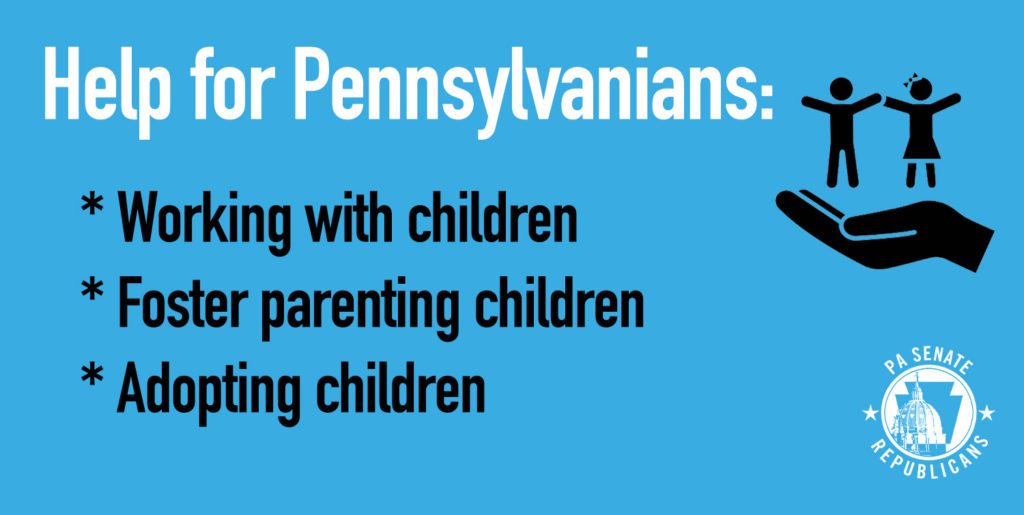
Many employees who work with children are unable to complete the necessary FBI criminal background checks due to the COVID-19 pandemic. I supported a bill this week that would allow them to continue to work safely.
The bill would extend the amount of time employees have to recertify background checks until December 31 and create different criteria for initial applicants to work on a temporary basis. More information about the bill is available here.
Senate Passes New Safety Measures for Child Care Facilities
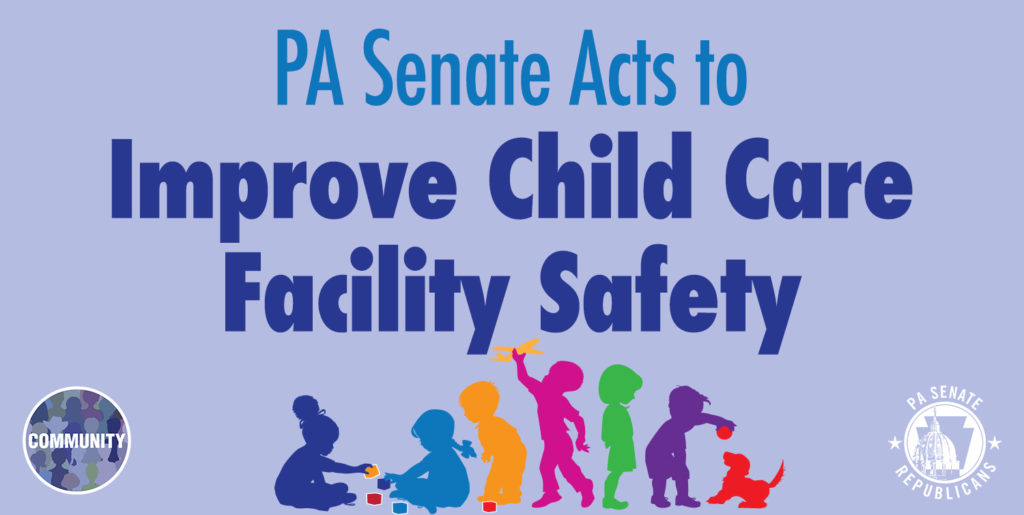
A pair of bills approved by the Senate this week would improve the safety of all child care facilities in Pennsylvania by strengthening smoke detector requirements. The measures would require smoke detectors in child care facilities on each floor and in the basement with a system that is interconnected so if one alarm is triggered, all of the alarms go off.
The bills were passed in response to a tragic fire at a home day care facility in Erie that claimed the lives of five young children. More information about the measures is available here.
DOH Sets Standards for Resumption of Elective Surgeries, Procedures

The Department of Health issued guidelines on Monday to allow hospitals and ambulatory surgery facilities to resume elective surgeries and admissions.
Under the guidelines, those facilities will be allowed to move forward with elective procedures as long as the safety of patients and staff is not placed in jeopardy and they have the resources in place to address potential COVID-19 emergencies. Hospital Guidelines ASF Guidelines
Legislation Would Provide Long-Term Authorization of Remote Notarizations
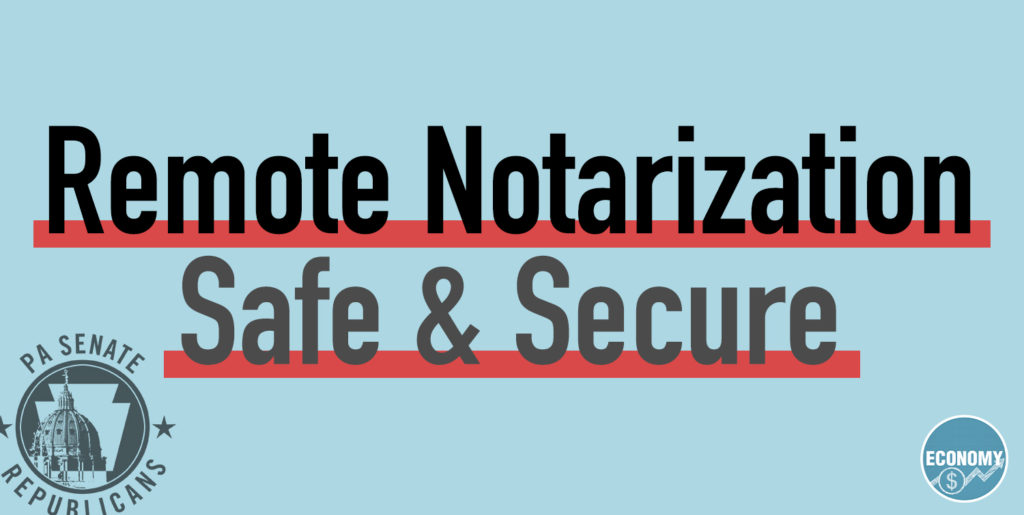
Earlier this month, the Senate passed legislation that was signed into law to authorize remote notary services for up to 60 days after the COVID-19 emergency declaration ends. Legislation approved by the Senate this week would allow the notarization process to be completed remotely on a long-term basis.
The bill would bring Pennsylvania in line with other states that have modernized laws pertaining to notarizing documents. More information about the bill is available here.
Food Recovery Infrastructure Grant Program Expanded

A critical grant program that supports charitable food organizations has been expanded to help meet the needs of state residents.
The $4 million Food Recovery Infrastructure Grant Program is intended to help charitable food systems such as food banks. The DEP expanded the list of organizations that charitable food systems may partner with beyond retailers and wholesalers to include farms, processors and cooperatives.
Applications are being accepted now through May 8. More information about the program and the application process is available here.
Additional Funding Will Support Seniors During COVID-19 Pandemic
The CARES Act approved by Congress will provide an additional $34 million to support programs for older Pennsylvanians, including home-delivered meals, home- and community-based services, long-term care and family caregiver support.
The programs supported by the funding will meet many of the most pressing needs of seniors, including transportation, care management, caregiver training and counseling, and information and referral services. The Pennsylvania Department of Aging’s website has more information about resources available to older adults.
|















